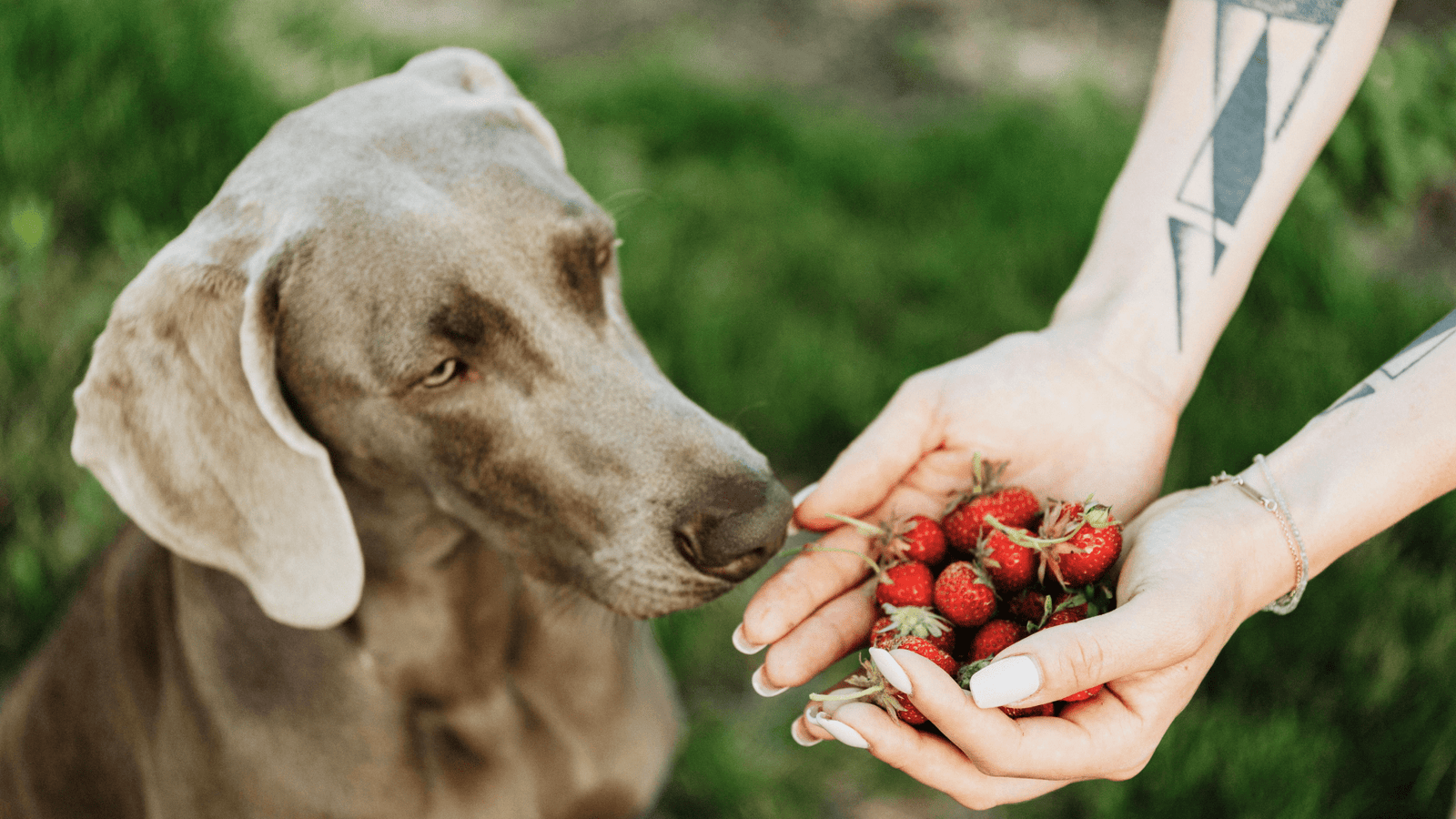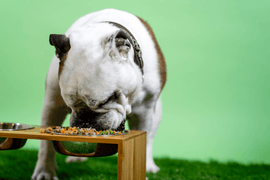What breed of sheep is your dog?
But why does your dog eat grass? You've probably wondered about it when you saw it grazing with its sharp little carnivore teeth. It only takes a few discussions with other owners to realize that this is a very common fad among our canine friends. According to an Australian study published in 2010, dogs are actually looking for fibre which, when it ferments in the intestine, makes them feel full. This is particularly the case for dogs with a diet that contains few or no vegetables. Yes! Dogs can eat fruits and vegetables; they are actually good for them.
In fact, fruit and vegetables contain vitamins, minerals, enzymes, water and, of course, fibre which, in reasonable amounts, is beneficial for the animal’s health. Fibre facilitates digestion, cleanses the intestine and prevents constipation. Since fruits and vegetables are generally low in calories, they make great snacks for more inactive dogs prone that are prone to being overweight. There are so many good reasons not to deprive them of fruit and veggies You should know, however, that some are poisonous—or even fatal—to dogs. To help sort this out, we've prepared a quick guide for you. Read on!
First, let’s talk about fruit
For a long time it was believed that fruit was bad for a dog’s health. Yet a wide variety of fruit are actually safe, including apples, pears, bananas, apricots, peaches, nectarines, plums, blueberries, melons and oranges. The important thing is to remove the pits and seeds as well as the peel or skin. In fact, some pits, like those in cherries and apricots for example, contain a toxin called cyanogenic glucosides. This is cyanide…a poison, in other words. Not to mention, there’s a risk of the pits getting stuck in the animal’s oesophagus. Also, avoid fruit that have begun to rot, as fermentation produces alcohol that is, of course, toxic. If you follow these few golden rules, it’s quite possible to safely feed small amounts of fruit to your dog.
How do they like vegetables? Steamed, please!
Although adult dogs tolerate raw fruit well, they do not have the enzymes necessary to break down the cell structure of vegetables; they must be boiled, steamed or crushed. The idea is to break down the cellulose in the vegetable cells to enable the body to absorb its nutrients (vitamins and minerals). So you cook them, you grind them, you mash them, and you choose the ones that best suit your animal.
Fruit and vegetables to avoid
Some fruit and vegetables are toxic to dogs; we can name at least one or two. It's best to know them, and if in doubt, check before serving an arsenic-laden treat to an animal that considers itself your best friend. Foods that should not be given to dogs include: avocados, eggplants, raw beans, raw potatoes, onions, garlic, radishes, quinces and elderberries, grapes (very toxic, in all its forms), tomatoes, artichokes and peas. Potatoes are to be avoided unless they are healthy and cooked. Even when cooked, onions, shallots, leeks and garlic can cause anemia and other serious health problems, if your pet has ingested a very, very large amount of them. Avoid feeding spinach and sorrel, and even green beans, carrots and eggplants, to dogs prone to urinary problems.
Here are 10 fruits and vegetables that will delight your dog
Coconut
Coconut works small miracles. It’s good for the skin and coat, the digestive system, the immune system as well as the bones and brain. It even protects against disease and speeds up healing. Its secret ingredient is lauric acid, which is highly beneficial for general health, in particular because it has antibacterial, antifungal, anti-inflammatory and antiviral properties.
Raspberries
Dogs love raspberries, so you have to watch them when they are near a raspberry bush. Raspberries are only good for them in small quantities (2 or 3 at a time). In large quantities they become very harmful (due to xylitol). Dogs who suffer from arthritis are particularly fond of them, as their anti-inflammatory properties soothe their pain.
Blueberries
Blueberries are the antioxidant par excellence. According to an analysis of the antioxidant levels of 40 fruits and vegetables by researchers at Tufts University in Massachusetts, blueberries ranked among the top (along with cranberries). They protect against certain cancers, heart disease, hypertension and aging. Anthocyanins, which belong to the phytochemical group of flavonoids, play an anti-inflammatory role, by inhibiting pro-inflammatory enzymes, such as cyclooxygenase-2. It’s best to slice them in half, as smaller-sized dogs will tell you, the risk of choking is very real.
Bananas
Because bananas are rich in vitamins (C and B6) and minerals, such as potassium and magnesium, they support heart health, regulate blood pressure, manage stress, and maintain healthy bones. They also contain flavonoids and polyphenols that neutralize free radicals, which are highly reactive molecules that can trigger oxidation. This deliciously sweet fruit is very high in calories and must be shared sparingly.
Melon
Melons are perfect in the summertime! They contain a lot of water, perfect for quenching your dog's thirst on hot days at the park. This is no substitute for a good bowl of fresh water, but melon has other benefits as well, like being an antioxidant, especially because it contains vitamins A and C. Melons are easy to digest.
Broccoli
Broccoli is great for older dogs, like most other vegetables in the cabbage family—except kale. This is because broccoli provides beneficial effects against osteoarthritis. A 2015 study by researchers at the Royal Veterinary College found that broccoli has soothing effects on symptoms resulting from arthritis and osteoarthritis. This is thanks to sulforaphane, a molecule essential for healthy living, which reduces joint inflammation and prevents deterioration of cartilage by blocking the enzymes responsible for their degeneration. Sulforaphane is also able to neutralize several carcinogenic substances. There’s a reason that it is often referred to as a "miracle" molecule. Broccoli is also rich in vitamins A, C and K, in addition to containing fibre and magnesium—a wonderful natural stress reliever. It’s very important to cook it and give it out it in small quantities, whether as a reward or as a meal supplement.
Pumpkin
Pumpkin contains vitamins and minerals, such as vitamins A, C and E, potassium and iron. It regulates digestion and can help prevent constipation or diarrhea. In fact, it is rich in soluble fibre which, when it ferments, produces fatty acids beneficial to health. These acids nourish cells, promote intestinal absorption of sodium and water, and lower the pH in the large intestines. Pumpkin, like squash, contains a lot of water and is very low in calories. It’s perfect for foodies. Depending on its size, give your dog about two to four tablespoons of boiled, baked, cubed or mashed pumpkin.
Sweet potatoes
These are nutritious and packed with vitamins and minerals. They lower the risk of cancer and cardiovascular disease as well as strengthen the immune system. They are also rich in carotenoids, an antioxidant that fights free radicals. In addition, they are easily digested.
Cucumber
Cucumbers are full of water and also contain fibre, potassium and beta-carotene. They stimulate digestion and preserve muscle mass. They are great antioxidants. Their phytochemicals fight bacteria that cause bad breath. Everybody wins!
Carrots
As you probably already know, some vets often recommend carrots. They are a great treat for dogs. While most vegetables absolutely need to be cooked to prevent digestive problems, carrots are the exception here. Served raw, they clean the teeth and gums. Because they activate salivation (the pH of saliva is basic), carrots reduce the acidity caused by bacteria and therefore the risk of oral infections. On the other hand, to get beta-carotene, a nutrient that prevents cell aging, it is better to cook or grind them. So, give your furry friend a raw toothbrush treat and a cooked dose of beta-carotene.



